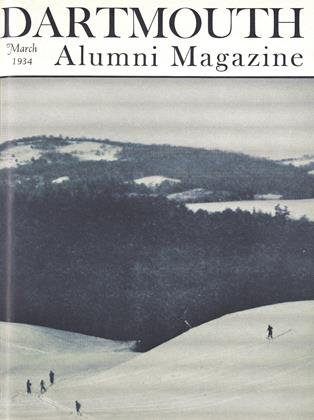THE largest and most publicized department of Dartmouth is, not surprisingly, the department of physical education and hygiene, embracing all branches of intercollegiate, intramural, and recreational athletics. Statistics for the past few years have shown that close to 90 per cent of the entire student body participates in some form of organized athletics during the college year, and the slogan "Sport for All" is quite near realization at Dartmouth.
The administration of this vast department has been cut up into four logical divisions, with Harry R. Heneage '07, supervisor of athletics, filling the role of general director. These divisions, which are of fairly recent definition, correspond to the departmental committees and include the three branches of organized athletics, plus the department of medical supervision. Robert J. Delahanty, who is chairman of the department of physical education, directs both recreational and intramural activities; Dr. John W. Bowler, as physical director, has complete medical supervision of all athletics; and Mr. Heneage, as executive officer of the Athletic Council, looks after intercollegiate sports.
"Rip" Heneage, the apex of the athletic pyramid, came to Dartmouth in April, 1927, with the rank of full professor, after twenty years in the steel business. As a halfback on the Dartmouth eleven of 1906, and later as a football official in the west, he gained a first-hand knowledge of football and made many athletic contacts.
While looking after the entire athletic program, Mr. Heneage's primary concern is with varsity and freshman sports. Maintenance of the Athletic Council offices, the sale and distribution of athletic tickets and season books, supervision of team finances, provision for athletic publicity, and the control of plant and equipment are some of the supervisor's duties, and they are all duties in which he is directly responsible to the Athletic Council. While intercollegiate athletics comprise a pigeon-hole of their own, the business of coordinating intercollegiate and recreational athletics, and, in turn, intramural and recreational activities, is one of the most important phases of the supervisor's work. The whole network of physical education is kept intertwined with very few snarls, considering the possibility for such tangles, and the supervisor's office was largely set up as just such a coordinating agency.
Robert J. Delahanty, who looks after the recreational and intramural branches of the athletic system, came to Dartmouth in 1926 after serving as physical director of Worcester Academy for nine years. He at present has the rank of an assistant professor. Mr. Delahanty was coach of water polo until that sport was dropped several years ago, and he still conducts his annual life-saving classes.
Required recreational activities, covering the freshman and sophomore years, are taught by a staff of thirteen coaches under Mr. Delahanty. A number of graduate assistants are also included in the instruction corps, while Harry W. Sampson '21, as clerk of the department, keeps voluminous records and dispenses cuts. The intramural department is handled by three undergraduate managers under the supervision of Mr. Delahanty, with an intramural council of representatives from the various campus organizations acting in an advisory capacity. By far the largest number of students participate in the voluntary athletics of the intramural office.
Something akin to a medical dictatorship is possessed by Dr. John W. Bowler, who has final say as to the physical fitness of a competitor in any of the three branches of sport, and who delivers the famous "smut" lectures to every freshman class. Dr. Joseph G. Pollard '23 is assistant physical director, and helps both in the lectures and in the hundreds of physical examinations which are made every year.
Dr. Bowler, who received his M. D. degree at Dartmouth in 1906, has been connected with the physical education department since 1901. Before that he was superintendent of the Charlesbank gymnasium of Boston, general superintendent of the public gymnasiums of Boston, and assistant to Dr. Sargent at Hemenway gymnasium, Harvard University. In 1907 DrBowler was elevated to the rank of full professor, and in 1910 Dartmouth conferred upon him an honorary Master's degree.
Athletic Head Harry R. Heneage '07, supervisor of athletics, who is directing Dartmouth's huge sports program.
 View Full Issue
View Full Issue
More From This Issue
-
 Class Notes
Class NotesClass of 1910
March 1934 By Harold P. Hinman -
 Class Notes
Class NotesClass of 1933
March 1934 By John S. Monagan -
 Class Notes
Class NotesClass of 1908
March 1934 By Laurence W. Griswold -
 Article
ArticleHANOVER BROWSING
March 1934 By Rees H. Bowen -
 Class Notes
Class NotesClass of 1930
March 1934 By Albert I. Dickerson -
 Article
ArticleTRIBUTES TO PROFESSOR LINGLEY
March 1934 By Friends and Associates













